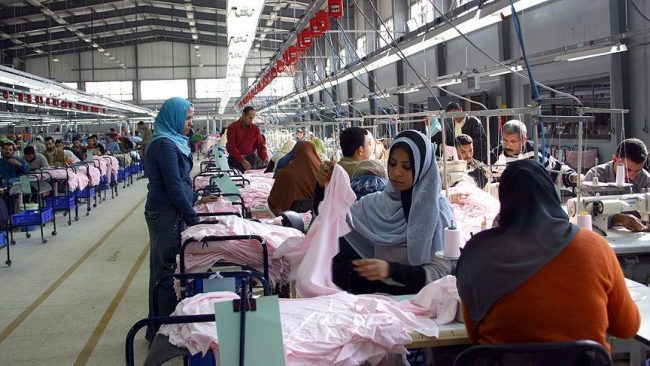Türkiye’s garment imports surge in 2024 amid concerns over ‘fixed’ currency
 File photo shows garments hang on wooden hangers in an outdoor retail display. (AA Photo)
File photo shows garments hang on wooden hangers in an outdoor retail display. (AA Photo)
Spearheaded by domestic brands, Türkiye’s garment imports rose by more than 15%, surpassing $4 billion and setting an all-time annual high, sparking concerns about the Turkish textile sector’s near future as it begins to adopt a consumption-driven model.
The garment and textile sector, which saw exports drop by over 6% last year, experienced a record-breaking increase in imports during the first 11 months of 2024. According to business-focused ekonomim.com, sector representatives anticipate that imports will close in 2024 at $4.5 billion, with projections for 2025 exceeding $5 billion.
As industry experts forecast, imports will continue to exponentially increase, driven by the period of strong Turkish lira, which they call “fixed” currency, and increasing reliance on international suppliers.
Garment imports from Egypt skyrocketed by 168%
China remained Türkiye’s top import source, accounting for $733 million. Meanwhile, Egypt, which has garnered growing attention from Turkish investors, saw its exports to Türkiye rise dramatically.
Ready-made imports from Egypt reached $260 million in just 11 months, surpassing the total for the previous year. By year’s end, this figure is expected to approach $300 million—a 168% increase over the past five years.

Other key import sources included Bangladesh with $304 million, Vietnam with $161 million, and India with $64 million. Spain also emerged as a notable contributor, with imports totaling $110 million during the first 11 months of 2024, primarily driven by major brands like Inditex and Mango exporting through their local warehouses.
Domestic brands shifting production abroad
Ramazan Kaya, President of the Turkish Clothing Manufacturers Association (TGSD), highlighted the unprecedented surge in imports, which have risen from an average of $2.5–2.6 billion to over $4 billion.
“Historically, imports accounted for about 14–15% of our total exports. Last year, this figure surpassed $4 billion, and we expect it to exceed $4.5 billion by the end of this year,” Kaya explained.
He attributed this trend to cost inflation, noting that local brands increasingly source from countries like Bangladesh, China, and Egypt. “Protective measures are not sufficient to curb import growth,” he added.
Seref Fayat, Chairman of the TOBB Ready-Made Clothing and Apparel Sector Assembly, warned that Türkiye’s reliance on imports will persist as long as domestic production costs remain uncompetitive.
“The strong lira has unfortunately fueled consumption-driven imports. While trade deficit reduction is being discussed, consumption spending continues to soar, limiting resources for production. Even Türkiye’s local brands struggle to manufacture domestically, leading to a dramatic rise in imports. With imports likely to reach $5 billion in 2025, I don’t foresee a different scenario unfolding,” Fayat said.



